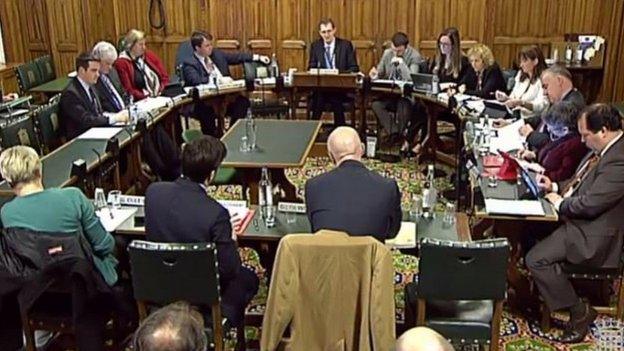Wales Bill: the talking is over (for a bit)
- Published
- comments

A draft grilling: MPs question Welsh Secretary Stephen Crabb and officials.
Well, that's that then. The select committee on Welsh affairs has completed its pre-legislative scrutiny of the draft Wales Bill. MPs will now spend the next few weeks reviewing the evidence received and drawing conclusions.
Chair David Davies has the challenge of uniting 11 MPs from four different political parties to try to produce a unanimous report. Mr Davies himself has described it as "a step closer to independence", external - he may struggle to find unanimity on that point. Indeed, many witnesses argued that far from moving Wales closer to independence, the Bill claws back powers from Wales (although that's disputed by the UK government).
Mr Davies led the questioning as the committee grilled for a second time Welsh Secretary Stephen Crabb, external, who indicated some areas where he was open to compromise - the list of reserved powers and "pre-commencement minister of the crown functions" - and also a red line: the assembly would not be allowed to legislate across the devolution divide without consent.
Between Mr Crabb's two appearances, Chancellor George Osborne announced that the government would drop the requirement for a referendum to be held before Wales acquires some power over income tax rates.
The Monmouth MP complained to Mr Crabb: "One of the key elements of the Bill is going to be the tax-raising powers, which is something we have not had any opportunity to scrutinise at all."
'Lockstep'
Mr Crabb said those powers were included in the Wales Act 2013 but was too polite to point out that as a draft Wales Bill it was indeed subject to pre-legislative scrutiny by the Welsh affairs committee, external chaired, ahem, by David Davies.
Nevertheless, Mr Davies wanted to know how wide-ranging the tax powers (he voted for) would be. He wanted to know if the "lockstep" would be removed - it was last year in legislation he scrutinised and voted for.
He went on: "Will the assembly have the power to slash the higher rate down to 10% if it wants to or up it to 80%? Will it be able to do virtually anything it wants within that field?
"Is it limited only by fiscal considerations or are there any legal considerations as well? Is there any point at which you as the government would step in and say, 'Hang on a minute, this has gone too far'?
Stephen Crabb: "We are talking about a 10 pence chunk of income tax. We are not devolving the whole of income tax down to Wales. It is 10 pence in the pound, so you have a chunk of income tax that is being devolved down. Within that chunk, the Welsh assembly will have the freedom to vary those bands as they see fit."
David Davies: "10 pence either way on each of the three bands?"
'Constraints'
Stephen Crabb: "No, they can vary as much as they want within that chunk of the overall 10 pence in the pound of income tax that we are devolving. What are the constraints on that? Economic constraints, political constraints, but we want Welsh government to be operating with those same kind of constraints.
David Davies: "We could theoretically see either 80 pence in the pound or 10 pence in the pound, yes or no?"
Stephen Crabb: "I am not sure I agree, really."
Wales Office official Geth Williams intervened: The key constraint will be the fact that 10 pence is being devolved. The political and policy choices for the Welsh government will be to vary each band of income tax—
Chair: "By 10 pence either way?"
Geth Williams: "Well, above or below. Materially, one could only imagine 1 or 2 pence being in consideration rather than 10 pence." (Although the Welsh Tories have suggested cutting the 40p higher rate by 5p in the pound).
Mr Davies later returned to the subject of tax, prompting Mr Williams to suggest the Wales Office could write to him.
The MPs hope their report will be published in mid-January, before Mr Crabb unveils the real (re-drafted) Wales Bill.